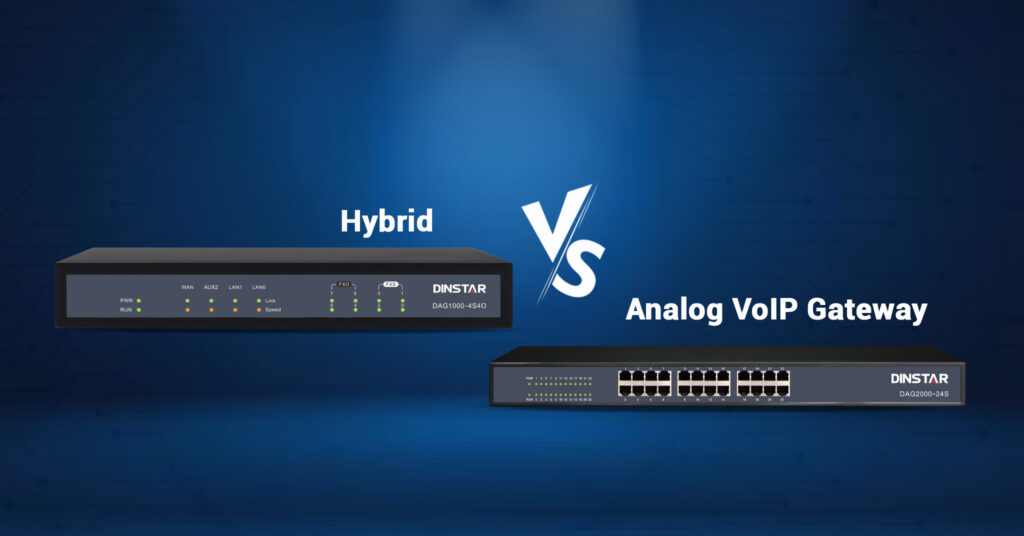As businesses transition to modern communication systems, the choice between Hybrid VoIP Gateways and Analog VoIP Gateway has become crucial. Companies looking to integrate VoIP with their existing infrastructure need to understand how these gateways work, their benefits, and which option best suits their business needs.
In this guide, we will explore the differences between Hybrid VoIP Gateways and Analog VoIP Gateways, compare their features, and help you determine the best solution for your business.
Related Product: SBC
What is an Analog VoIP Gateway?
An Analog VoIP Gateway, also known as a Gateway Analog, is a device that connects traditional analog phones, fax machines, and legacy PBX systems to a VoIP network. It converts analog voice signals into digital packets, allowing businesses to use VoIP services without replacing their entire telephone infrastructure.
Key Features of an Analog VoIP Gateway
- FXS and FXO Ports – Supports analog phone lines and PBX systems.
- VoIP Conversion – Converts analog signals into digital VoIP packets.
- Compatibility with Legacy Systems – Works with existing analog telephony infrastructure.
- Multiple Port Options – Available in configurations such as 4 FXS Port VoIP Gateway, 8 Port VoIP Gateway, and 16 Port FXS Gateway to support different business needs.
Advantages of Using an Analog VoIP Gateway
- Cost Savings – Enables businesses to continue using existing analog phones instead of investing in expensive VoIP handsets.
- Seamless VoIP Integration – Bridges the gap between traditional and IP-based communication.
- Reliability – Analog phone systems often remain functional even during power or internet failures.
- Easy Deployment – Requires minimal configuration, making it ideal for businesses with non-technical staff.
Limitations of an Analog VoIP Gateway
- Limited Scalability – Best suited for businesses with small to medium communication needs.
- Basic Functionality – Lacks advanced VoIP features like call routing and SIP trunking.
- Dependence on Analog Infrastructure – Requires maintenance of existing analog lines.
Related Product: DINSTAR UC120
What is a Hybrid VoIP Gateway?
A Hybrid Gateway is a versatile VoIP solution that supports both analog and IP-based communication. It allows businesses to connect legacy analog systems with modern VoIP networks, providing a flexible transition to digital communication.
Key Features of a Hybrid VoIP Gateway
- Dual Connectivity – Supports both analog phone lines and IP-based communication.
- SIP Trunking Compatibility – Enables seamless integration with modern VoIP service providers.
- Advanced VoIP Features – Includes call routing, IVR, and cloud PBX support.
- Multiple Port Configurations – Available in 4 FXS Port VoIP Gateway, 8 Port VoIP Gateway, and 16 Port FXS Gateway models for different scalability needs.
Advantages of Using a Hybrid VoIP Gateway
- Smooth Transition to VoIP – Businesses can gradually migrate to VoIP without disrupting their existing phone system.
- Scalability – Supports expansion by allowing businesses to add more VoIP lines over time.
- Enhanced Features – Offers VoIP functionalities like call forwarding, call recording, and SIP trunking.
- Future-Proofing – Helps businesses stay competitive by adopting modern communication technology.
Limitations of a Hybrid VoIP Gateway
- Higher Initial Cost – More expensive than an Analog VoIP Gateway due to advanced features.
- Internet Dependency – Relies on internet connectivity for VoIP functionality.
- Configuration Complexity – Requires proper setup and technical expertise for optimal performance.
Which One Should Your Business Choose?
When to Choose an Analog VoIP Gateway
- Ideal for businesses that primarily rely on analog phone systems and are not ready to migrate to VoIP.
- Provides a cost-effective way to connect traditional phones to a VoIP network.
- Suitable for businesses with basic communication needs that do not require advanced VoIP features.
- A reliable choice for locations with unstable internet connectivity, where analog systems offer more stability.
Related Product: 32 Port Fxs Gateway
When to Choose a Hybrid VoIP Gateway
- Best for businesses planning a gradual transition from analog to VoIP without replacing their entire system at once.
- Supports both PSTN and VoIP connectivity, offering greater flexibility.
- Scalable solution that can adapt to the growing communication needs of a business.
- Provides access to advanced VoIP features such as SIP trunking, call forwarding, and cloud integration.
Popular Analog and Hybrid VoIP Gateway Models
Depending on the size of your business and communication requirements, you may need different port configurations. Here are some of the most common options:
1. 4 FXS Port VoIP Gateway
- Ideal for small businesses with limited analog devices.
- Provides connectivity for up to four analog phones or fax machines.
- A cost-effective solution for basic VoIP integration.
2. 8 Port VoIP Gateway
- Suitable for medium-sized businesses with more extensive telephony needs.
- Can support a combination of FXO and FXS ports.
- Offers better scalability compared to a 4-port model.
3. 16 Port FXS Gateway
- Best for enterprises or call centers with large analog phone deployments.
- Enables seamless VoIP connectivity for multiple devices.
- Provides the highest level of scalability among Analog and Hybrid Gateways.
Final Thoughts: Which VoIP Gateway is Best for Your Business?
Choosing between an Analog VoIP Gateway and a Hybrid VoIP Gateway depends on your business size, infrastructure, and future communication goals.
- If you want a budget-friendly solution that connects analog phones to VoIP with minimal disruption, a Gateway Analog is the right choice.
- If you need a long-term, scalable solution with VoIP features while maintaining analog connectivity, a Hybrid VoIP Gateway is the best investment.
Ultimately, businesses looking for flexibility, scalability, and modern VoIP features should opt for Hybrid VoIP solutions, while those wanting a simple, cost-effective integration can go with an Analog VoIP Gateway.

